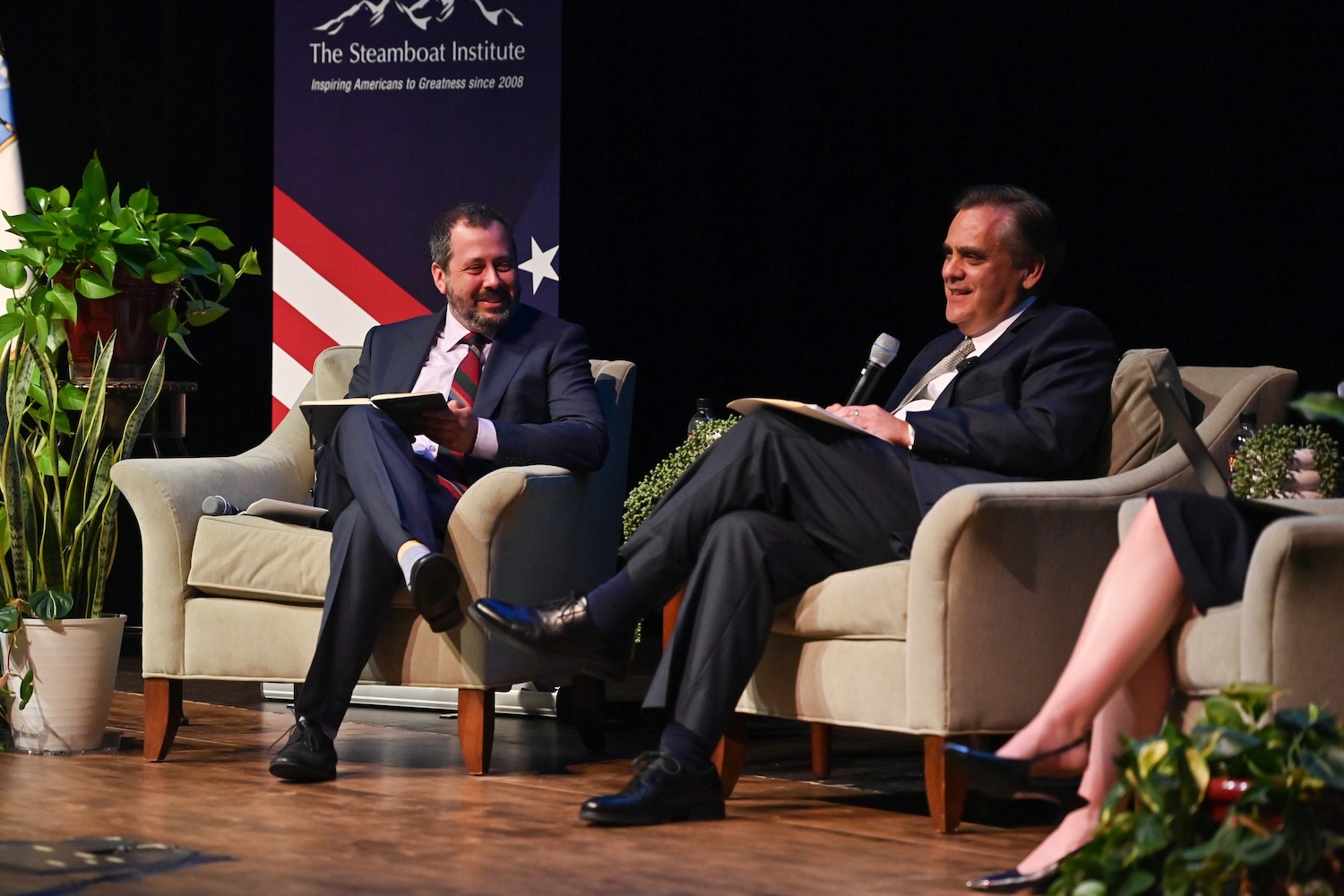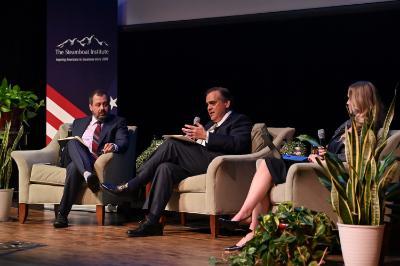Debate on Constitutional Crisis Draws Crowd to VMI

Daniel Farbman responds to a humorous remark from Jonathan Turley during the debate in Gillis Theater. –VMI Photo by H. Lockwood McLaughlin.
LEXINGTON, Va. Oct. 6, 2025 — Is the United States experiencing a constitutional crisis? That was the resolution debated at Virginia Military Institute Sept. 30 before a large audience in Gillis Theater. The debate was part of the fall Steamboat Institute Campus Liberty Tour, and was co-hosted by VMI’s Center for Leadership and Ethics. Daniel Farbman, associate professor at Boston College Law School, argued the affirmative of the resolution, and arguing the negative was Jonathan Turley, faculty member of George Washington University Law School and nationally recognized legal scholar who has served as legal analyst for CBS, NBC and Fox News. The debate was moderated by Kaylee McGhee White, editor-in-chief for Independent Women Features and a Tony Blankley Senior Fellow at Steamboat Institute.
Each debater gave an opening statement. Farbman declared that the country is in a moment of crisis. “To me, it seems evident that we are in a political and civic crisis, and that it has a lot to do with our Constitution and its failure to get us out of that crisis by itself. That meets the threshold of a constitutional crisis. The things we want from our Constitution are political stability, democracy, a form of checks and balances, and a protection of individual rights. I think there’s a lot of people on both sides of the aisle right now who are anxious about whether or not we have a functioning, democratic, and legitimate system. That anxiety is something that’s really troubling. I don’t think Congress right now feels empowered to step in and be a check against executive power.” To which he gave the example of the renaming of the Department of War. “Congress didn’t name it that, but the administration knows that Congress won’t go back and change the name.” Regarding individual rights, he asked, “How secure do we feel about First Amendment rights? How secure do we feel about being arrested without a warrant?”
Turley in his opening statement avowed the country is not in a constitutional crisis, but a crisis of faith. “The fact is, the Constitution of the United States wasn’t just written for times like this, it was written in a time like this. It’s a dangerous conceit every generation has, that our problems are so unique, so insurmountable, that we have to change the rules, that the problem is with the Constitution, not in ourselves. This is a constitution that was designed to last. We have the most stable and successful constitutional system in the history of the world. Don’t confuse a crisis of faith with a constitutional crisis. This Constitution defines us as a people. If we have faith in it, we can withstand what’s coming in the 21st century, which is a challenge like we’ve never faced before. The problems we have today are our problems, not our Constitution’s.
The moderator then guided the conversation of the two opponents. first asking them to define a constitutional crisis.
Farbman defined it as a moment in which the Constitution comes under stress and its previous incarnation is no longer serviceable. “A classic example would be, the Constitution before 1867 permitted slavery. It had to be changed. Did that actually eviscerate the Constitution? No, it was an amendment that changed the Constitution. If we have a crisis, and the Constitution as it’s currently structured is not up to meeting that crisis, then the people are charged with either rethinking or remaking the Constitution to meet that crisis. This feels like one of those moments.”
Turley began his answer with one of the lighter moments of the evening. “The closest I’ve come to a constitutional crisis was two days ago. I had tickets to the Cubs playoffs and realized I was going to be here. I was fortunate, I did not have to choose between the Cubs playoffs and defending the Constitution.” After the audience’s laughter subsided he continued, “No, we’re not in a constitutional crisis. Many people on the other side of the aisle saying we are in a constitutional crisis are the same people that were arguing that Trump should be kept off a ballot of an election that he ended up winning. So, there is a bias here. What I don’t see is the evidence that the Constitution is failing. What people cite is that the political system is not doing what they want it to do. I don’t think a dispute over whether we call it the Department of Defense or the Department of War is a constitutional crisis. When you talk about slavery, the Constitution worked because part of the Constitution says we can amend the Constitution. I don’t see any evidence this constitutional system is broken. The closest we have gotten to a constitutional crisis I would say, was when Abraham Lincoln suspended habeas corpus [a court order that requires a prisoner to be brought before a judge to determine if their detention is lawful].”
The moderator turned to current events and asked, “Is President Trump abusing his executive power by deploying the National Guard to police certain cities in blue states?”
Turley replied that it depends on the circumstances. “D.C. is a federal enclave, and he was completely within his rights to do so. He’s also going to call out the National Guard in places like Louisiana. It’s perfectly legal, the governor there has invited the deployment. It gets much more difficult legally with governors who do not agree to the deployment. That will be quickly sorted out in court. We’ve already had a couple of decisions, another example of how our system works. So, the National Guard deployment is going to have to be sorted out in those states. But Trump can flood the zone with federal, ICE, and FBI officers, and there’s not a thing that the governors or the mayors can do about that. It’s the use of National Guard troops when the governor is opposing it that raises a legitimate legal question.”
 Farbman responded by saying, “Even if Trump abides by a specific legal order, he explicitly talked about deploying not just the National Guard, but federal troops to democratically controlled American cities. That doesn’t sound to me like a president who’s been chastened by a legitimate constitutional ruling. I don’t think it’s particularly puzzling or a difficult legal question whether it’s okay to deploy National Guard troops to a state without the governor’s permission. I think we have to ask the question: ‘How protected do we feel by the court’s decision in that instance?’”
Farbman responded by saying, “Even if Trump abides by a specific legal order, he explicitly talked about deploying not just the National Guard, but federal troops to democratically controlled American cities. That doesn’t sound to me like a president who’s been chastened by a legitimate constitutional ruling. I don’t think it’s particularly puzzling or a difficult legal question whether it’s okay to deploy National Guard troops to a state without the governor’s permission. I think we have to ask the question: ‘How protected do we feel by the court’s decision in that instance?’”
Another question regarding current events the moderator asked was, “Do the attacks using drones and other high tech weaponry on alleged drug smugglers coming into the United States amount to unconstitutional acts of extrajudicial assassination without authorization from Congress?”
Turley stated, “These are people that the President has defined as a national security threat outside the country. Presidents have in fact, ordered a great number of people killed outside of our borders on the basis of national security. I don’t know of a law that would prevent him from doing that. Presidents have issued cruise missile strikes in foreign countries based on the same national security determination.
Farbman replied that Congress has the only and sole power to declare war. “Whether or not Congress has abdicated its responsibility and authority to actually regulate when we do and do not fire guns and shoot missiles at people, I think this is a long standing, deeply problematic constitutional problem. Because if you decide someone on a boat, who might be a fisherman, is a terrorist, you blow them up. That’s precisely why Congress is supposed to have the power, and not the president.”
The moderator asked additional questions from audience members submitted digitally on varying topics ranging from how well Congress is doing its job, to how the Constitution should be changed, to the stagnation of getting laws passed. The two speakers answered the questions in turn respectfully, thoughtfully, sometimes jovially, and always amicably. They then each gave brief closing statements.
Farbman declared that the country is divided, but not in a normal division. “Many people in this country feel existential anxiety about whether they are protected by the Constitution. This isn’t just the way things are. Something is different. My word for that is a crisis. If something is different, then we have to act together, and go back to those core values of political stability, democracy, separation of powers, and individual rights. To the extent that those things don’t feel safe to us right now, that is a crisis. We need to do something about it. I believe that we’re always authorized and required to be remaking our Constitution in order for it to be legitimate. Because it is a document of self-government.”
In his closing Turley said, “The American Constitution was designed to protect us from ourselves, to protect us from not just tyranny, but what was called democratic despotism. It limits us. Our Constitution is more than just an archaic device that establishes a relationship of three branches. It is a covenant for a new citizen, a new people, and it requires a leap of faith, particularly in a time of rage like we have today. Rage is an amazing thing. It allows you to do and say things you would not normally do or say. It’s contagious and addictive, and people like it because they can question institutions and demand radical changes. I think we’re greater than whatever political crisis is in front of us. What we do now is what we’ve always done. We’ll argue with each other, maybe yell at each other, but eventually we will come together because we will remember that we have so much more in common than we have in difference. We’re not in a crisis.”
The audience had the opportunity to record their stance on the debate topic in the pre- and post-debate polls. Prior to the debate, 31% agreed with the resolution, 54% disagreed, and 15% were undecided. After the debate, 23% agreed, 72% disagreed, and only 5% remained undecided, declaring Turley the victor. The debate in its entirety may be viewed here.
Following the debate, the audience was invited to a brief reception in the Hall of Valor to meet Farbman and Turley.
According to Daniel Wagner, director of the Campus Liberty Tour, Steamboat Institute was founded in 2008 in Steamboat Springs, Colorado, for the purpose of educating people about America’s first principles and fostering an appreciation of the freedom Americans enjoy. “We have hosted dozens of debates on college campuses across America for the past seven and a half years. Why debates? Because civil debate and discourse, not violence, are the key to solving our problems. When we stop talking to each other, bad things happen,” stated Wagner.
The fall Steamboat Institute Campus Liberty Tour continues through November with debates at Cornell University, Oct. 8; the University of Texas, Austin, Oct. 15; the University of Maryland, Oct. 28; Grand Canyon University, Nov. 4; and the University of Colorado, Colorado Springs, Nov. 13. All debates will be livestreamed. Additional information and how to register is available on Steamboat Institute’s website.
Marianne Hause
Communications & Marketing
VIRGINIA MILITARY INSTITUTE
.svg)
.png)